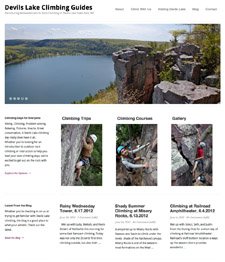How to Choose a Climbing Guide?
Just got off the phone with Mike, a gentleman looking for solid technical rock climbing instruction for himself and his teenage son. Mike spent lots of time on the rock 30 years ago, but time has rusted his memory and skills, so he wants someone sharp to teach his son sound foundational skills. Seems like a typical scenario, right? But how should a guy like Mike go about finding good climbing instruction? There is a LOT of information out there on the internet; how does someone like Mike (let alone someone with no experience at all) sort through the fluff to find the gold? To this end, I'd like to offer some advice on searching for a rock climbing guide. Obviously, my advice is biased and there is a conflict of interest here, so read on with a mouthful of salt. But I have been in the guiding business for many years, and I can offer a few useful tips for anyone hunting for a quality climbing guide, whether it be at Devils Lake or elsewhere.
Evaluate the Guide Service's Website
You can learn a lot from a website. First off, consider the general appearance: Is the site professional, aesthetic, and easy to browse? Is the text spelled and edited correctly? Do the links work? Are the trips/courses described thoroughly? How a guide service creates and maintains its website says a lot about how it approaches other aspects of their business too, like how they treat their equipment, their staff, or you as a client.
Next, look for more subtle things. Are the people in the pictures wearing helmets? This is a great evaluative tool. If the climbers are NOT wearing helmets, you either have a a guide service that doesn't require helmets (not good) or a guide service that uses pictures of their climbing buddies for advertising because they don't have any clients. Either way, it's a bad sign.
Look for Professional Safety Certification
In most states and parks (including Devil's Lake), there are no laws regulating who can and who cannot be a rock climbing guide. That's right: You have to go to school and pass rigorous test to cut someone's hair or file their taxes, but there's no required test or schooling to dangle people from 100-foot climbs. Sort of strange, right? In Europe, guiding is a highly regulated industry, but in the States, it is barely regulated at all.
Nevertheless, individuals in the climbing community have joined together over the years to create organizations that raise guiding safety standards and offer voluntary certification for climbing instructors, because the best professionals in every industry want to see their industry prosper and grow. The Professional Climbing Guides Institute (PCGI), Professional Climbing Instructors Association (PCIA), and the American Mountain Guide Association (AMGA) are the major certifying bodies in the U.S., each occupying a different niche in guide certification. When interviewing a guide service, ask whether your guide will be a certified climbing instructor. That doesn't simply mean they took a class (which anyone can do); it means they passed a rigorous certification assessment afterward. One easy way to check into certification is to look for an certification emblem on the guide service website: if you find such an emblem, there's a good chance the guide service is certified. To be sure, check the guide listings on the certifying body's website. (You can find my own listing, for example, on the AMGA Hire a Guide page.)
Interview the Guide and/or Guide Service
There nothing more important than actually speaking with your potential guide or guide service. Most people can get a strong impression of a guides professionalism, client rapport, and organizational skills by asking a few good questions in a 5-minute conversation. For example, Mike and I chatted a bit about his experience and what he was looking for, then he asked me, "Will you tell me a little about your organization and philosophy?" Nice! That's exactly what I want to talk to clients about, because I've thought about my business and pedagogy plenty and have thoughts to offer here. By asking a sophisticated, open-ended question, Mike put me on stage and asked me to perform, just like I would have to when out climbing with him. A great guide will have great speaking skills, a well-developed philosophy on how and what they do, and a comfortable, relaxed approach to answering your questions, and these same skills will set them apart as an instructor during your climbing trip/course. So get on the phone and riddle your guide with a few questions; the good ones will thank you for it.
A few good questions for any guide service:
• Are you insured? Most guides services are insured, but no law requires it. Make sure your guide carries liability insurance that will protect you and them in case something horrible and unforeseen were to happen.
• Where does your experience lie? A guide can claim he/she has been climbing for x years or that they've been in business for y years... but what does that actually mean? For myself, I've only been in business for a month (that doesn't sound good, does it?), but I have over 800 days of technical guiding under my belt while managing another guide service (a mix of climbing and canyoneering) and an additional 100+ days of personal experience to boot. I've worked commercially with lots of solo and small groups, and also with large groups up to 40 - 50 people; I've worked with 5-year old kids (lots of them) and 85-year-old adventurers (only a few of those). Ask your guide specific questions about their experience; you may find many guides have only limited commercial experience, which is a lot different than personal climbing with friends.
• Who will I actually be climbing with? When a guide service starts to grow, oftentimes the most experienced guides (the owners) end up being more involved with business and less involved with actual guiding. Make sure the glowing credentials a guide service advertises actually fit your guide, and not just the owners.
There are a lot a great guide services out there, so make sure you find a good one, even if that means some extra research and a few phone calls. In the end, you're paying good money for someone who will not only protect your life, but who will hopefully spark a life-long passion for a new sport. Is it worth finding the right person? Absolutely. Good luck!



